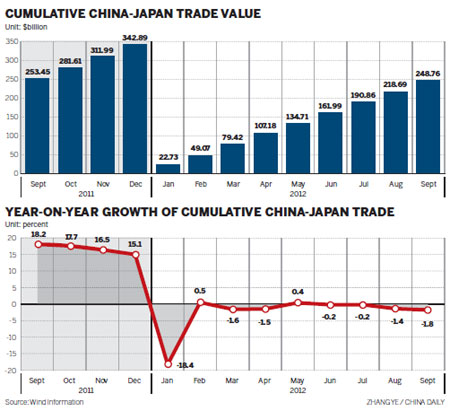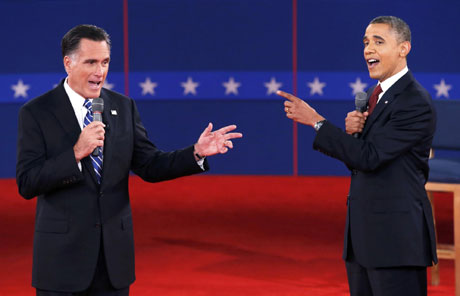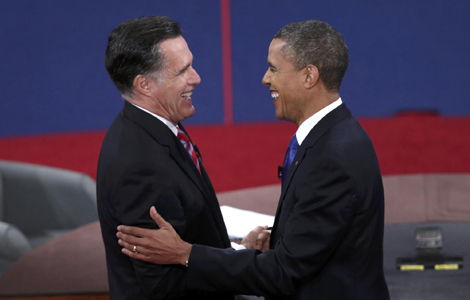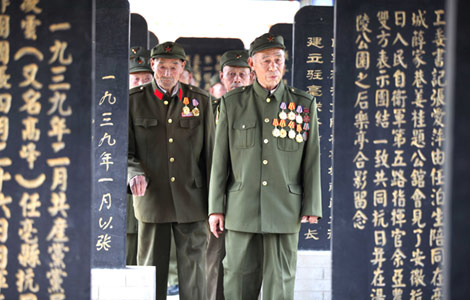Dispute adds to Tokyo's woes
Updated: 2012-10-23 08:57
By Chen Jia (China Daily)
|
||||||||
Exports to China fall 14.1% in Sept as Japan's deficit reaches $7b
Japan's exports to China dropped sharply in September, hit by the row over the Diaoyu Islands, adding to market concerns about the outlook for the world's third-largest economy in the fourth quarter.
|
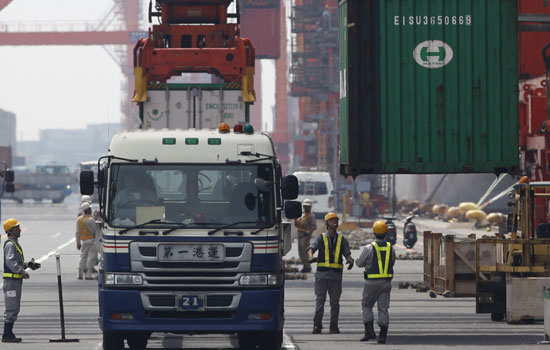 |
|
Workers oversee a container being loaded onto a truck at a port in Tokyo. Japan's exports fell the most since last year's earthquake as the global slowdown, the yen's strength and a dispute with China increase the odds of a contraction in the world's third-largest economy. [Photo/Agencies] |
The total volume of Japan's exports fell 10.28 percent year-on-year in September, which was the largest decline since the aftermath of the 2011 earthquake, leaving a deficit of 558.6 billion yen ($7 billion), according to data released on Monday by Japan's Finance Ministry.
This is Japan's third consecutive monthly deficit.
Its export volume has shrunk for four consecutive months since June as demand decreased amid weak global growth.
The year-on-year drop was 5.79 percent in August and 8.11 percent in July.
Japan's exports to China fell 14.1 percent year-on-year in September, the fourth consecutive monthly fall. The decline has accelerated from 9.9 percent in August and 11.9 percent in July, according to official Japanese data.
"The significant contraction in Japan's exports was absolutely influenced by strained relations with China since September," said Yao Haitian, a researcher at the Institute of Japanese Studies at the Chinese Academy of Social Sciences.
The gloomy export outlook may add to the problems faced by the world's third-largest economy, which could push the Japanese government to take more measures to stabilize growth, Yao said.
According to a report from JPMorgan, the row between Japan and China is expected to drag Japan's gross domestic product down by 0.8 percentage points in the fourth quarter.
Exports to China, Japan's largest trade partner, are the source of 2.8 percent of Japan's GDP, and its total exports usually contribute 14 to 17 percent of its economic growth.
Japanese government lowered its economic expectations for a third straight month in October, as economic indicators showed decreasing machinery orders in August, indicating that the world's third-largest economy may be seeing the longest economic slowdown since the 2009 global recession.
"Japan's exports to China may continue to decline in the coming months as the two countries have yet to find a way to resolve the issue," said Yao.
Data from China's General Administration of Customs showed that the value of Sino-Japanese trade fell 4.5 percent year-on-year in September, when China saw an increase of 2.2 percent in its exports to Japan and a 9.6 percent decrease in imports.
In the first nine months, the countries' trade saw a net decrease of 1.8 percent year-on-year to $248.7 billion, according to the General Administration of Customs.
A report from the global market research provider Ipsos Business Consulting said the number of Japanese cars sold in China fell to 122,200 in September from 175,200 in August.
The company said the chief contributor to the decline in sales was "the Chinese people's strong reaction to the Diaoyu Islands dispute".
The dispute has also affected Japan's foreign direct investment in China.
By the end of the third quarter, the growth of Japan's investment in China this year had slowed to 17 percent from 50 percent in the same period last year, reaching a total volume of $5.62 billion, according to the Ministry of Commerce.
In the longer term, strained China-Japan relations may also hurt China's economy, specially in cross-border trade and investment, experts said.
"It is important to figure out how to control the dispute and take measures to maximize the two countries' common interests," said Ju Jiandong, a professor at the School of Economics and Management at Tsinghua University.
chenjia1@chinadaily.com.cn
